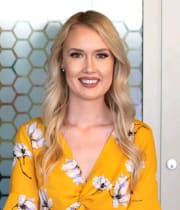Man gets “second chance at life” 1,700 miles from home

Alaska attorney Robert Palmer’s roots connect back to the founding of Tacoma’s first hospitals.
In 1929, his great grandmother Henrietta Sowa, RN — who served as assistant director of nurses at Tacoma General Hospital — helped establish Allenmore Hospital.
Palmer, city attorney for Juneau, found himself at the health care system his grandmother helped found nearly a century later.
While Palmer’s mom was visiting Juneau in February 2023, he knew something was wrong.
“We had a nice family dinner and I felt queasy, which is unusual for me,” he recalls. “I knew something felt weird, and for the first time in a long time, I went to the hospital in Juneau.”
There, doctors began investigating the cause of Palmer’s symptoms, ordering a computed tomography (CT) scan. The CT scan revealed a softball-sized mass on top of his large intestine that was preventing food from moving through.
Palmer’s care team began working on clearing the blockage, performing a colonoscopy to look for a diagnosis.
“I remember [the doctor] talking to my wife and some family,” Palmer shares. “He said ‘It definitely looks like cancer. It looks like it’s definitely progressed. It’s large. For somebody who’s 42 years old, it’s unusual to see a cancer that big, especially for colon cancer.’”
Colorectal cancer, often called colon cancer, is the third-leading cause of cancer-related death in both men and women in the U.S. It’s the second most common cause of cancer deaths when numbers for men and women are combined.
The American Cancer Society recommends people at average risk start regular screening for colorectal cancer at age 45.
Traveling south to MultiCare Regional Cancer Center
Given the complexity and severity of Palmer’s case, his doctors in Juneau had critical advice for him: Travel to Anchorage or Seattle to seek advanced oncology care or risk a longer recovery process.
With much of his family still living in western Washington, Palmer took their advice and began searching for oncology providers in the greater Seattle area.
His search brought him 1,700 miles south of his home to MultiCare Regional Cancer Center (MRCC) in Tacoma — the first place to answer his urgent call.
Powered by donor support, MRCC is the South Puget Sound’s only comprehensive network of cancer centers. The center offers the only colorectal cancer program in western Washington that’s received certification through the National Accreditation Program for Rectal Cancer — a recognition granted to programs committed to providing the best possible cancer care to patients with rectal cancer.
Palmer flew to Seattle and temporarily moved in with friends in Tacoma. He went in for an initial consultation with medical oncologist Blair Irwin, MD, and colorectal surgeon Laila Rashidi, MD, FACS, FASCRS.
“I have to give MultiCare credit because here’s a patient from southeast Alaska who you’ve never interacted with and has a complicated cancer issue — we didn’t have a pathology report back yet — and they were able to find space in their super busy schedules to see me for a consult,” Palmer explains.
Just a week after his consultation, Dr. Rashidi performed surgery on Palmer, removing a portion of his large intestine. With assistance from a da Vinci robot — a robotic system funded in part by donations through the MultiCare Health Foundation — the procedure was less invasive, more precise and allowed Palmer to return home from surgery faster.
“Going into surgery, Dr. Rashidi told me, ‘If this goes well, my goal is to have you out of the hospital within 24 hours,’ and she pulled it off within 23,” he shares. “She’s absolutely talented and the surgery team she worked with that day was just incredible.”
Support for the whole family
After a successful surgery with Dr. Rashidi, Palmer completed two rounds of chemotherapy in Tacoma, followed by subsequent rounds back home in Juneau. 
As he navigated his diagnosis and treatment alongside his wife and daughter, nurse navigator Becky Aurand, RN, helped care for Palmer’s whole family.
“We’re from Alaska and we have lots of family in western Washington, but Tacoma’s not home,” he explains. “One of the big hurdles that I was enduring was that I have a 9-year-old daughter who’s in third grade, and trying to figure out how to tell her what happened or what’s happening to me.
“We decided as a family that it’s better for her to stay in school to have a little bit of normalcy, even though I was in Tacoma,” Palmer continues. “Becky was able to help get me through and set up appointments with genetic counseling and with a child therapist through the Discoveries program. That seemed to really help things. I just want to give her credit because she helped me on the clinical side and on the mental health side.”
Discoveries — a program within Bridges Center for Grieving Children — is a family program offered to support children ages 4-18 who are experiencing the serious diagnosis of a family member. Made possible in part by donor support, the program provides a supportive, creative and understanding environment for children and their families.
Now, Palmer is back in Juneau with his family as he continues treatment at a nearby hospital.
Through his cancer care journey, he’s been reminded of his great grandmother’s legacy that helped save his life and thousands more.
“I didn’t fully appreciate it then, but having a female leading a hospital in the ’30s who was a nurse is just spectacular,” Palmer shares. “And to think that her actions roughly 90 years later gave me the opportunity to have a second chance at life is pretty special.”
What's next
- Help support cancer patients and survivors
- Learn more about colorectal cancer screening
- Services offered by the Bridges Center for Grieving Children




